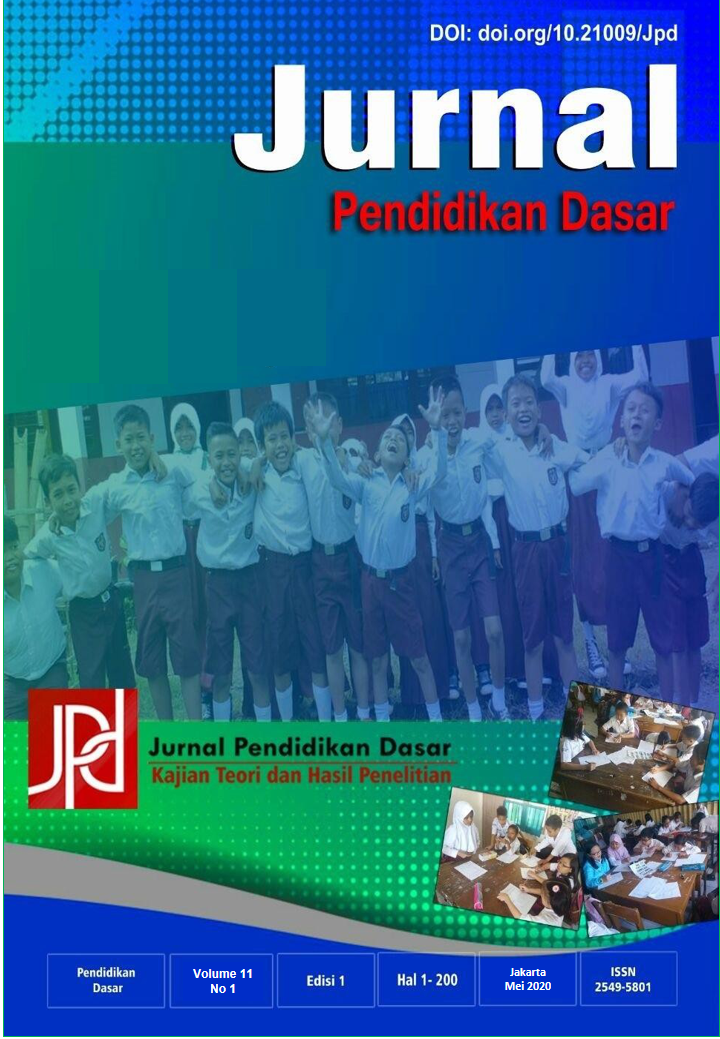HUBUNGAN PEER ACCEPTANCE DAN MOTIVASI BELAJAR DENGAN PRESTASI BELAJAR SISWA KELAS V SD
DOI:
https://doi.org/10.21009/jpd.v11i1.15238Keywords:
peer acceptance, learning motivation, student achievementAbstract
This research was conduct to describe the correlation between peer acceptance and learning motivation with learning achievement, the correlation between peer acceptance and learning achievement, and the correlation between learning motivation and student achievement in 5th grade in SDN Subdistrict of Klojen, Malang. This research was an ex-post facto by using quantitative approach with correlational methods. The subject of this research was 209 5th grade students taken from 7 elementary schools. The research result: 1) Have a positive and significant correlation between peer acceptance and learning motivation with learning achievement by Fcount 44.885>Ftable 3.039 with a significance level of 5%, and the significance value was 0.000<0.05. An effective contribution of 30%, while the remaining 70% is explained by other variables. 2) Have a positive and significant correlation between peer acceptance and learning achievement by tcount 3.060>ttable 1.972 and the significance value is 0.003<0.05. 3) Have a positive and significant relationship between learning motivation and learning by tcount 4.341>ttable 1.972 and the significance value is 0.000<0.05.
References
Desmita. (2014). Psikologi Perkembangan Peserta Didik. Bandung: Remaja Rosdakarya.
Gallardo, L.O., Barrasa, A., & Guevara-Viejo, F. (2016). Positive Peer Relationships and Academic Achievement Across Early and Midadolescence. Social Behavior and Personality: an International Journal, 44(10), 1637-1648. https://doi.org/10.2224/sbp.2016.44.10.1637.
Hanifah, N. (2016). Sosiologi Pendidikan. Sumedang: UPI Sumedang Press.
Hurlock, E.B. (1988). Perkembangan Anak (Volume 1). Terjemahan Meitasari Tjandrasa & Muslichah Zarkasih. Jakarta: Erlangga. 1978.
Husamah, Pantiwati, Y., Restian, A., & Sumarsono, P. (2018). Belajar dan Pembelajaran. Malang: UMM Press.
Jannah, M. (2015). Tugas-Tugas Perkembangan Pada Usia Kanak-Kanak. International Journal of Child and Gender Studies, 1(2), 87-98. https://www.jurnal.ar-raniry.ac.id/index.php/equality/article/download/792/622.
Karwati, E. & Priansa, D.J. (2015). Manajemen Kelas: Guru Profesional yang Inspiratif, Kreatif, Menyenangkan, dan Berprestasi. Bandung: Alfabeta.
Kompri. (2016). Motivasi Pembelajaran: Perspektif Guru dan Siswa. Bandung: Remaja Rosdakarya.
Kurniawan, D., & Wustqa, D.U. (2014). Pengaruh Perhatian Orangtua, Motivasi Belajar, dan Lingkungan Sosial terhadap Prestasi Belajar Matematika Siswa SMP. Jurnal Riset Pendidikan Matematika, 1(2), 176ˉ 187. https://journal.uny.ac.id/index.php/jrpm/article/viewFile/2674/2227.
Latipah, E. (2017). Psikologi Dasar Bagi Guru. Bandung: Remaja Rosdakarya.
Lubbers, M. J., Van Der Werf, M. P., Snijders, T. A., Creemers, B. P., & Kuyper, H. (2006). The Impact of Peer Relations on Academic Progress in Junior High. Journal of School Psychology, 44(6), 491ˉ 512. https://doi.org/10.1016/j.jsp.2006.07.005.
Muflikhah & Dwihartanti, M. (2018). Pengaruh Pergaulan Teman Sebaya dan Konsentrasi Belajar terhadap Hasil Belajar Siswa Mata Pelajaran Teknologi Perkantoran Kelas X OTKP Di SMK Muhammadiyah 1 Tempel Tahun Ajaran 2017/2018. 703-713.
Mujiastuti, A.I.C. & Ilyasir, F. (2016). Pengaruh Pertemanan Sebaya Terhadap Prestasi Belajar Pendidikan Agama Islam Siswa Kelas XI SMA Negeri 1 Sewon, Bantul Tahun Pelajaran 2013/2014. Jurnal Literasi, 6(1), 77-97. https://www.researchgate.net/publication/312969504/link/5ab07357a6fdcc1bc0be19a6/download.
Ni’mah, U. (2017). Hubungan Minat dan Motivasi Belajar dengan Hasil Belajar IPS Kelas V SDN Gugus Pangeran Diponegoro Kabupaten Pati. Skripsi diterbitkan. Semarang: Fakultas Ilmu Pendidikan UNNES.
Palittin, I.D., Wolo, W. & Purwanty, R. (2019). Hubungan Motivasi Belajar dengan Hasil Belajar Siswa. Jurnal Keguruan dan Ilmu Pendidikan, 6(2), 101-109. https://ejournal.unmus.ac.id/index.php/magistra/article/download/1801/1219/.
Susanto, P. (2018). Belajar Tuntas: Filosofi, Konsep, dan Implementasi. Jakarta: Bumi Aksara.
Wijaya, E.Y., Sudjimat, D.A. & Nyoto, A. (2016). Transformasi Pendidikan Abad 21 Sebagai Tuntutan Pengembangan Sumber Daya Manusia di Era Global. Prosiding Seminar Nasional Pendidikan Matematika 2016, 1(26), 263-278.
Zakiyah, Q.Y. & Rusdiana, A. (2014). Pendidikan Nilai: Kajian Teori dan Praktik di Sekolah. Bandung: Pustaka Setia.
Downloads
Published
How to Cite
Issue
Section
License
Jurnal Pendidikan Dasar





















